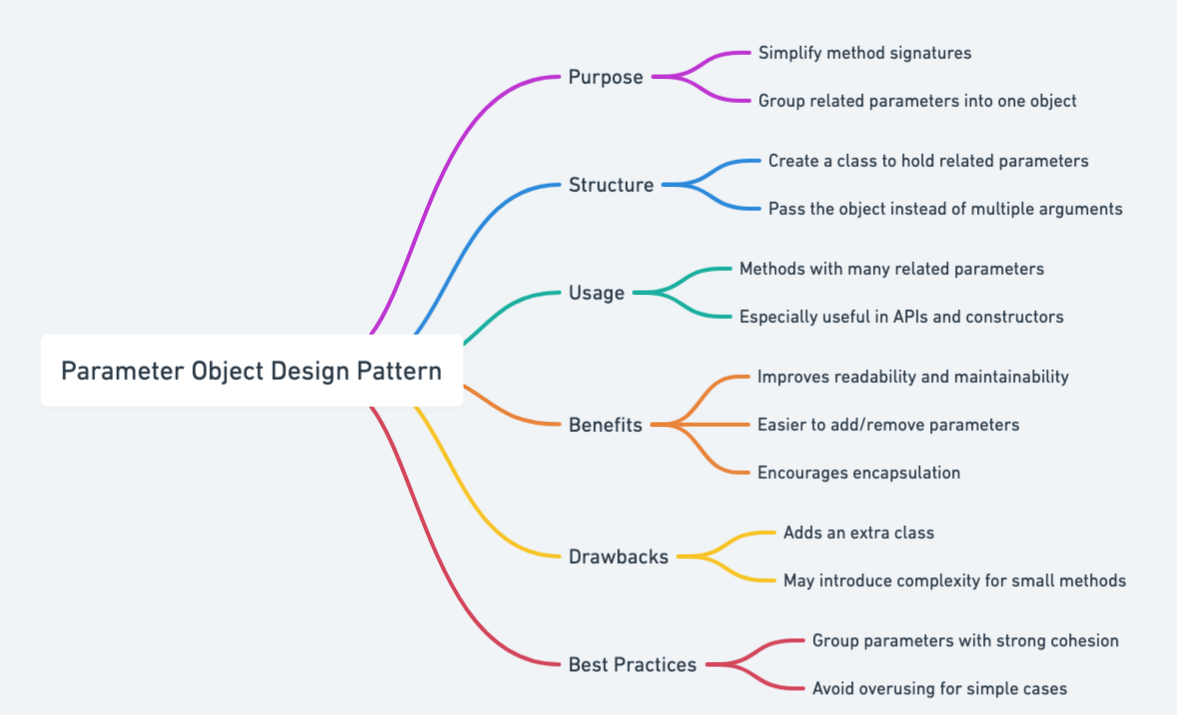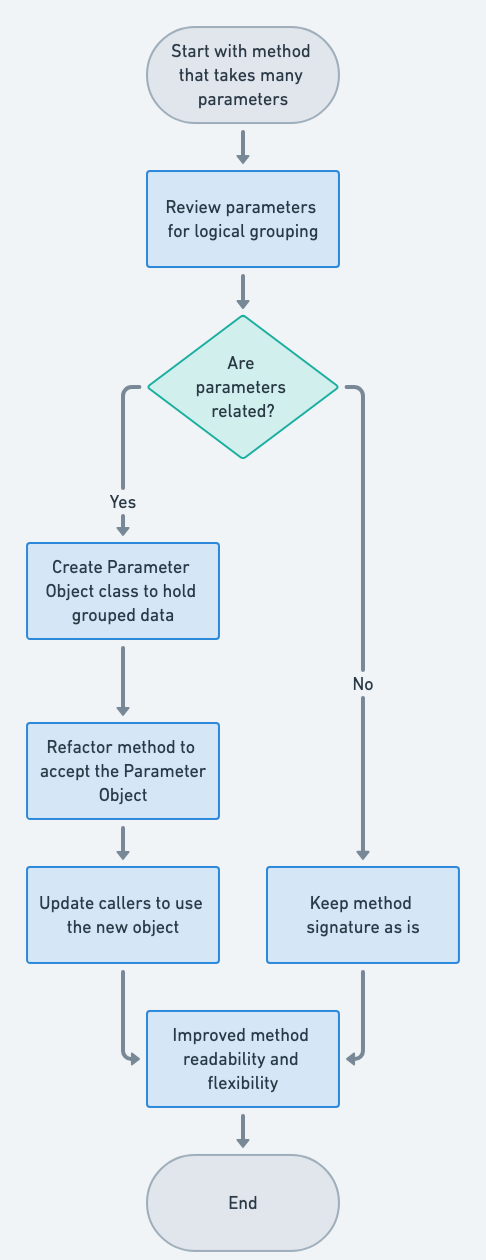Parameter Object Pattern in Java: Simplifying Method Signatures with Structured Data
Also known as
- Argument Object
Intent of Parameter Object Design Pattern
The Parameter Object pattern is a key Java design pattern aimed at improving code maintainability by reducing method complexity through encapsulation of parameters into a single object.
Detailed Explanation of Parameter Object Pattern with Real-World Examples
Real-world example
Imagine booking a travel package that includes a flight, hotel, and car rental. Instead of asking the customer to provide separate details for each component (flight details, hotel details, and car rental details) every time, a travel agent asks the customer to fill out a single comprehensive form that encapsulates all the necessary information:
- Flight details: Departure city, destination city, departure date, return date.
- Hotel details: Hotel name, check-in date, check-out date, room type.
- Car rental details: Pickup location, drop-off location, rental dates, car type.
In this analogy, the comprehensive form is the parameter object. It groups together all related details (parameters) into a single entity, making the booking process more streamlined and manageable. The travel agent (method) only needs to handle one form (parameter object) instead of juggling multiple pieces of information.
In plain words
The Parameter Object pattern encapsulates multiple related parameters into a single object to simplify method signatures and enhance code maintainability.
wiki.c2.com says
Replace the LongParameterList with a ParameterObject; an object or structure with data members representing the arguments to be passed in.
Mind map

Flowchart

Programmatic Example of Parameter Object Pattern in Java
The Parameter Object design pattern is a way to group multiple parameters into a single object. This simplifies method signatures and enhances code maintainability enabling Java developers to streamline complex method calls, focusing on cleaner and more maintainable Java code.
First, let's look at the ParameterObject class. This class encapsulates the parameters needed for the search operation. It uses Builder pattern to allow for easy creation of objects, even when there are many parameters.
public class ParameterObject {
private final String type;
private final String sortBy;
private final SortOrder sortOrder;
private ParameterObject(Builder builder) {
this.type = builder.type;
this.sortBy = builder.sortBy;
this.sortOrder = builder.sortOrder;
}
public static Builder newBuilder() {
return new Builder();
}
// getters and Builder class omitted for brevity
}The Builder class inside ParameterObject provides a way to construct a ParameterObject instance. It has methods for setting each of the parameters, and a build method to create the ParameterObject.
public static class Builder {
private String type = "all";
private String sortBy = "price";
private SortOrder sortOrder = SortOrder.ASCENDING;
public Builder withType(String type) {
this.type = type;
return this;
}
public Builder sortBy(String sortBy) {
this.sortBy = sortBy;
return this;
}
public Builder sortOrder(SortOrder sortOrder) {
this.sortOrder = sortOrder;
return this;
}
public ParameterObject build() {
return new ParameterObject(this);
}
}The SearchService class has a search() method that takes a ParameterObject as a parameter. This method uses the parameters encapsulated in the ParameterObject to perform a search operation.
public class SearchService {
public String search(ParameterObject parameterObject) {
return getQuerySummary(parameterObject.getType(), parameterObject.getSortBy(),
parameterObject.getSortOrder());
}
// getQuerySummary method omitted for brevity
}Finally, in the App class, we create a ParameterObject using its builder, and then pass it to the search() method of SearchService.
public class App {
public static void main(String[] args) {
ParameterObject params = ParameterObject.newBuilder()
.withType("sneakers")
.sortBy("brand")
.build();
LOGGER.info(params.toString());
LOGGER.info(new SearchService().search(params));
}
}This example demonstrates how the Parameter Object pattern can simplify method signatures and make the code more maintainable. It also shows how the pattern can be combined with the Builder pattern to make object creation more flexible and readable.
When to Use the Parameter Object Pattern in Java
- Methods require multiple parameters that logically belong together.
- There is a need to reduce the complexity of method signatures.
- The parameters may need to evolve over time, adding more properties without breaking existing method signatures.
- It’s beneficial to pass data through a method chain.
Parameter Object Pattern Java Tutorials
Real-World Applications of Parameter Object Pattern in Java
- Java Libraries: Many Java frameworks and libraries use this pattern. For example, Java’s java.util.Calendar class has various methods where parameter objects are used to represent date and time components.
- Enterprise Applications: In large enterprise systems, parameter objects are used to encapsulate configuration data passed to services or API endpoints.
Benefits and Trade-offs of Parameter Object Pattern
Benefits:
- Encapsulation: Groups related parameters into a single object, promoting encapsulation.
- Maintainability: Reduces method signature changes when parameters need to be added or modified.
- Readability: Simplifies method signatures, making the code easier to read and understand.
- Reusability: Parameter objects can be reused across different methods, reducing redundancy.
Trade-offs:
- Overhead: Introducing parameter objects can add some overhead, especially for simple methods that do not benefit significantly from this abstraction.
- Complexity: The initial creation of parameter objects might add complexity, especially for beginners.
Related Patterns
- Builder: Helps in creating complex objects step-by-step, often used in conjunction with parameter objects to manage the construction of these objects.
- Composite: Sometimes used with parameter objects to handle hierarchical parameter data.
- Factory Method: Can be used to create instances of parameter objects, particularly when different parameter combinations are needed.